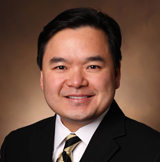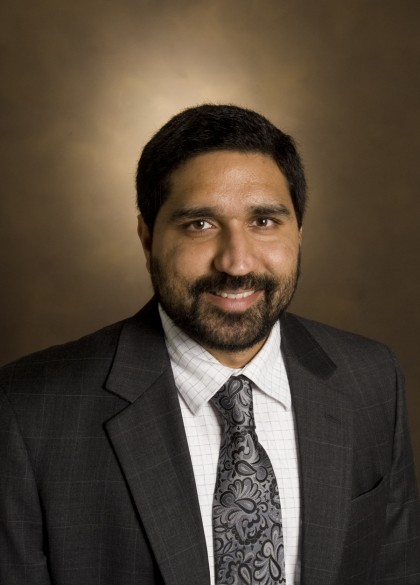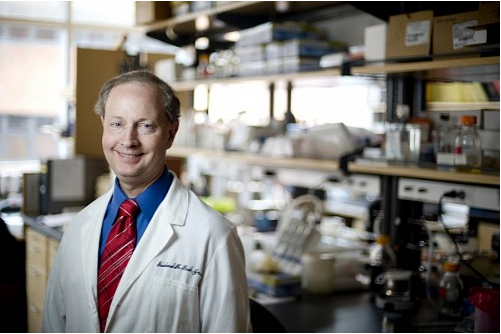Vanderbilt University Medical Center’s Richard Ho, M.D., MSCI, has received a presidential honor for his innovative studies of mechanisms by which drug transporter proteins mediate the absorption, distribution and elimination of chemotherapeutic agents.
Ho, associate professor of Pediatrics, is one of 102 researchers to receive the Presidential Early Career Award for Scientists and Engineers (PECASE). Established by President Bill Clinton in 1996, the annual awards program is the highest honor bestowed by the U.S. government on science and engineering professionals in the early stages of their independent research careers.
A 1997 graduate of Vanderbilt University School of Medicine, Ho also served his residency here in Pediatrics and well as two fellowships — one in Pediatric Hematology/On-cology and a research fellowship in Clinical Pharmacology. He joined the faculty in 2003.
The specific drug-transporting proteins that Ho studies are organic anion-transporting polypeptides (OATPs), primarily expressed in organs of importance to drug disposition, including the liver, intestine and kidney. In addition to studying mechanisms of drug transport, another major focus in Ho’s laboratory centers on cancer pharmacogenetics — delineating the roles of genetic variance in drug transporter genes in contribution to interindividual variability in chemotherapy response and toxicity.
“My research interests arose from my clinical training as a pediatric oncologist,” Ho said. “In most cases, we have to administer dose-intensive chemotherapy regimens that carry significant risks for adverse effects. Children are pretty resilient in general, as we don’t typically have to deal with co-morbidities like hypertension, heart disease or diabetes that may exist in adult cancer patients, but they can still experience severe and even life-threatening toxicities.
“Ultimately, we are trying to improve chemotherapy dosing to minimize the risk for toxicities while maximizing chances for efficacy and cure. At some point in the future we may be able to personalize chemotherapy dosing regimens for children afflicted with cancer,” he said.
“I’m very honored and humbled to be chosen as a recipient of this award. It is gratifying to me that this award highlights the importance of pediatric cancer research in advancing treatments and cures for children with cancer, as this is a chronically underfunded area of research,” Ho said. “The award is also a reflection of the excellent research training and mentorship I’ve received in my time at Vanderbilt, especially from Richard Kim (now at the University of Western Ontario) and Michael Stein (Clinical Pharmacology).”
PECASE recipients are employed or funded by the following departments and agencies: Department of Agriculture, Department of Commerce, Department of Defense, Department of Education, Department of Energy, Department of Health and Human Services, Department of the Interior, Department of Veterans Affairs, Environmental Protection Agency, National Aeronautics and Space Administration, National Science Foundation, the Smithsonian Institution, and the Intelligence Community.
Ho’s nomination for this award came from the National Institutes of Health, an agency of the U.S. Department of Health and Human Services. The winners will receive their awards at a Washington, D.C., ceremony sometime this year.
“We are incredibly proud of Dr. Ho’s accomplishments and this very well-deserved honor,” said Debra Friedman, M.D., E Bronson Ingram Professor of Pediatric Oncology, associate professor of Pediatrics and director of the Division of Pediatric Hematology/Oncol-ogy.
“Dr. Ho embodies the very essence of a successful physician scientist. He provides the highest level of care with great compassion to his patients and their families. In the laboratory, his work is contributing to discovery that will further the field of precision medicine for cancer patients, which is essential to improving outcome.”
In 2012, Ho received an R01 grant from NIH — $1.7 million over five years — to study “Hepatic OATP Drug Transporters and Chemotherapy Disposition.” As part of the presidential award, the NIH will extend Ho’s R01 grant, 5R01GM099924-02, sponsored by the National Institute of General Medical Sciences, with at least one year of additional funding.
“The impressive achievements of these early-stage scientists and engineers are promising indicators of even greater successes ahead,” President Obama said in a press release about the award winners. “We are grateful for their commitment to generating the scientific and technical advancements that will ensure America’s global leadership for many years to come.”
Ho is one of six current Vanderbilt faculty to receive a PECASE. Others are Bradley Malin, Ph.D., Biomedical Informatics (2010), MacRae Linton, M.D., Medicine and Pharmacology (1997); Bridget Rogers, Ph.D., Chemical and Biomolecular Engineering (2002); Bruce McCandliss, Ph.D., Psychology (2006); and Sharon Weiss, Ph.D., Engineering and Physics (2009).
















